View in other NatureServe Network Field Guides
NatureServe
Montana
Utah
Wyoming
Idaho
Wisconsin
British Columbia
South Carolina
Yukon
California
New York
Tall Pussytoes - Antennaria anaphaloides
Native Species
Global Rank:
G5
State Rank:
S4S5
(see State Rank Reason below)
C-value:
4
Agency Status
USFWS:
USFS:
BLM:
External Links
State Rank Reason (see State Rank above)
Common and widespread across portions of western and central Montana. See rank details.
- Details on Status Ranking and Review
Population Size
Score0 - Large: Generally >100,000 individuals.
Range Extent
Score0 - Widespread species within Montana (occurs in 5% or more of the state or generally occurring in 6 or more sub-basins.) as well as outside of Montana.
Area of Occupancy
Score0 - High: Occurs in >25 Subwatersheds (6th Code HUC’s).
Environmental Specificity
Score0 - Low: Species is a generalist that occurs in a variety of habitats and/or is tolerant of disturbed or degraded habitats (C -Values of 1-4).
Trends
ScoreNA - Rank factor not assessed.
Threats
Score0 - Low: Impacts, if any, to the species are expected to be minor or insignificant (affecting <10% of populations) in severity, scope and immediacy.
CommentNo widespread threats exist.
Intrinsic Vulnerability
Score0-1 - Low to Moderate Vulnerability.
Raw Conservation Status Score
Score
0 to 1 total points scored out of a possible 16.
General Description
Rhizomatous, non-stoloniferous. Stems erect, 6–50 cm. Basal leaf blades oblanceolate to narrowly elliptic, 3–12 cm long, 3- to 5-nerved. Stem leaves linear to narrowly lanceolate, 1–8 cm long, usually flagged. Inflorescence corymbiform with numerous heads. Involucre: female 4–8 mm high; male 4–6 mm high. Phyllaries brown at the base contrasing with a white upper portion. Corolla female 2–5 mm long; male 1.5–3 mm long. Pappus 3–5 mm long. Achenes 1–2 mm long, glabrous (
Lesica et al. 2012. Manual of Montana Vascular Plants. BRIT Press. Fort Worth, TX).
Species Range
Montana Range
Range Descriptions
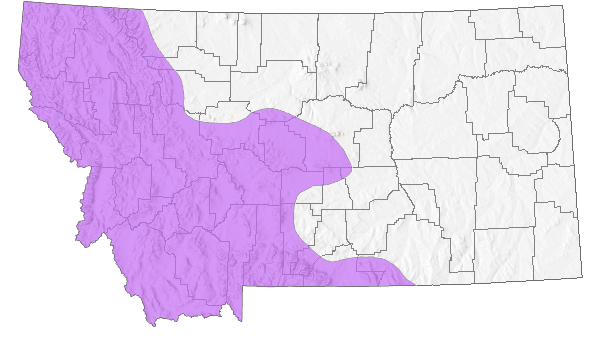
 Native
Native
Range Comments
BC to SK south to OR, UT and CO (Lesica et al. 2012. Manual of Montana Vascular Plants. BRIT Press. Fort Worth, TX).
Observations in Montana Natural Heritage Program Database
Number of Observations: 178
(Click on the following maps and charts to see full sized version)
Map Help and Descriptions
Relative Density
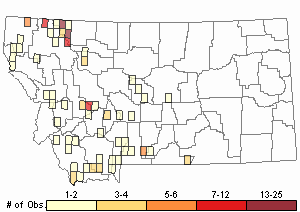
Recency
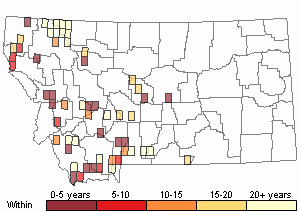

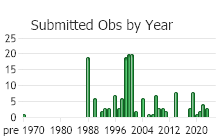
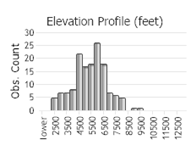 (Observations spanning multiple months or years are excluded from time charts)
(Observations spanning multiple months or years are excluded from time charts)
Habitat
Ecology
POLLINATORS The following animal species have been reported as pollinators of this plant species or its genus where their geographic ranges overlap:
Bombus pensylvanicus (Colla and Dumesh 2010).
Stewardship Responsibility
References
- Literature Cited AboveLegend:
 View Online Publication
View Online Publication Colla, S.R. and S. Dumesh. 2010. The bumble bees of southern Ontario: notes on natural history and distribution. Journal of the Entomological Society of Ontario 141:39-68.
Colla, S.R. and S. Dumesh. 2010. The bumble bees of southern Ontario: notes on natural history and distribution. Journal of the Entomological Society of Ontario 141:39-68. Lesica, P., M.T. Lavin, and P.F. Stickney. 2012. Manual of Montana Vascular Plants. Fort Worth, TX: BRIT Press. viii + 771 p.
Lesica, P., M.T. Lavin, and P.F. Stickney. 2012. Manual of Montana Vascular Plants. Fort Worth, TX: BRIT Press. viii + 771 p.
- Additional ReferencesLegend:
 View Online Publication
View Online Publication
Do you know of a citation we're missing? Aho, Ken Andrew. 2006. Alpine and Cliff Ecosystems in the North-Central Rocky Mountains. Ph.D. Dissertation. Bozeman, Montana: Montana State University. 343 p.
Aho, Ken Andrew. 2006. Alpine and Cliff Ecosystems in the North-Central Rocky Mountains. Ph.D. Dissertation. Bozeman, Montana: Montana State University. 343 p. Culver, D.R. 1994. Floristic analysis of the Centennial Region, Montana. M.Sc. Thesis. Montana State University, Bozeman. 199 pp.
Culver, D.R. 1994. Floristic analysis of the Centennial Region, Montana. M.Sc. Thesis. Montana State University, Bozeman. 199 pp. Jones, W. W. 1901. Preliminary flora of Gallatin County. M.S. Thesis. Bozeman, MT: Montana State College. 78 pp.
Jones, W. W. 1901. Preliminary flora of Gallatin County. M.S. Thesis. Bozeman, MT: Montana State College. 78 pp. Lesica, P., M.T. Lavin, and P.F. Stickney. 2022. Manual of Montana Vascular Plants, Second Edition. Fort Worth, TX: BRIT Press. viii + 779 p.
Lesica, P., M.T. Lavin, and P.F. Stickney. 2022. Manual of Montana Vascular Plants, Second Edition. Fort Worth, TX: BRIT Press. viii + 779 p. Quire, R.L. 2013. The sagebrush steppe of Montana and southeastern Idaho shows evidence of high native plant diversity, stability, and resistance to the detrimental effects of nonnative plant species. M.Sc. Thesis. Bozeman, MT: Montana State University. 124 p.
Quire, R.L. 2013. The sagebrush steppe of Montana and southeastern Idaho shows evidence of high native plant diversity, stability, and resistance to the detrimental effects of nonnative plant species. M.Sc. Thesis. Bozeman, MT: Montana State University. 124 p. Simanonok, M. 2018. Plant-pollinator network assembly after wildfire. Ph.D. Dissertation. Bozeman, MT: Montana State University. 123 p.
Simanonok, M. 2018. Plant-pollinator network assembly after wildfire. Ph.D. Dissertation. Bozeman, MT: Montana State University. 123 p.
- Web Search Engines for Articles on "Tall Pussytoes"





